This topic describes how to add a new Card Object to a Screen or a Container and its specific properties.
To create a new Card Object, you need to access a Screen in Design Mode.
Once you're in the Screen editing page, locate the Card Object from the Screen Objects list in the left panel, then drag and drop it onto your Screen or Container.
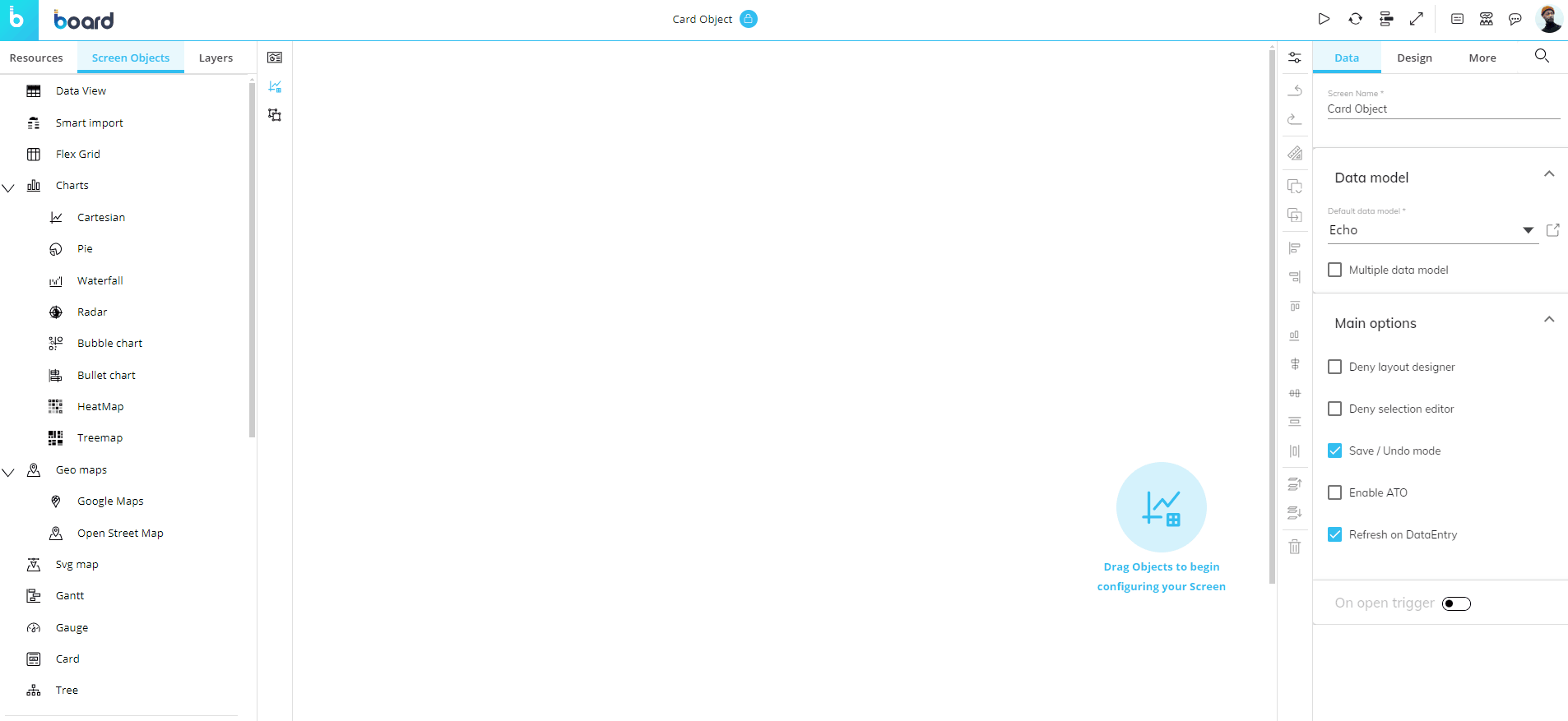
When you create a Card Object, it is initially empty. The next step is to configure a Layout that will define the data to be displayed. To do so, click on the Object or select the Object and click the "Configure Layout" button (  ) located in the Properties Toolbar located vertically alongside the Properties panel to the right of the Screen.
) located in the Properties Toolbar located vertically alongside the Properties panel to the right of the Screen.
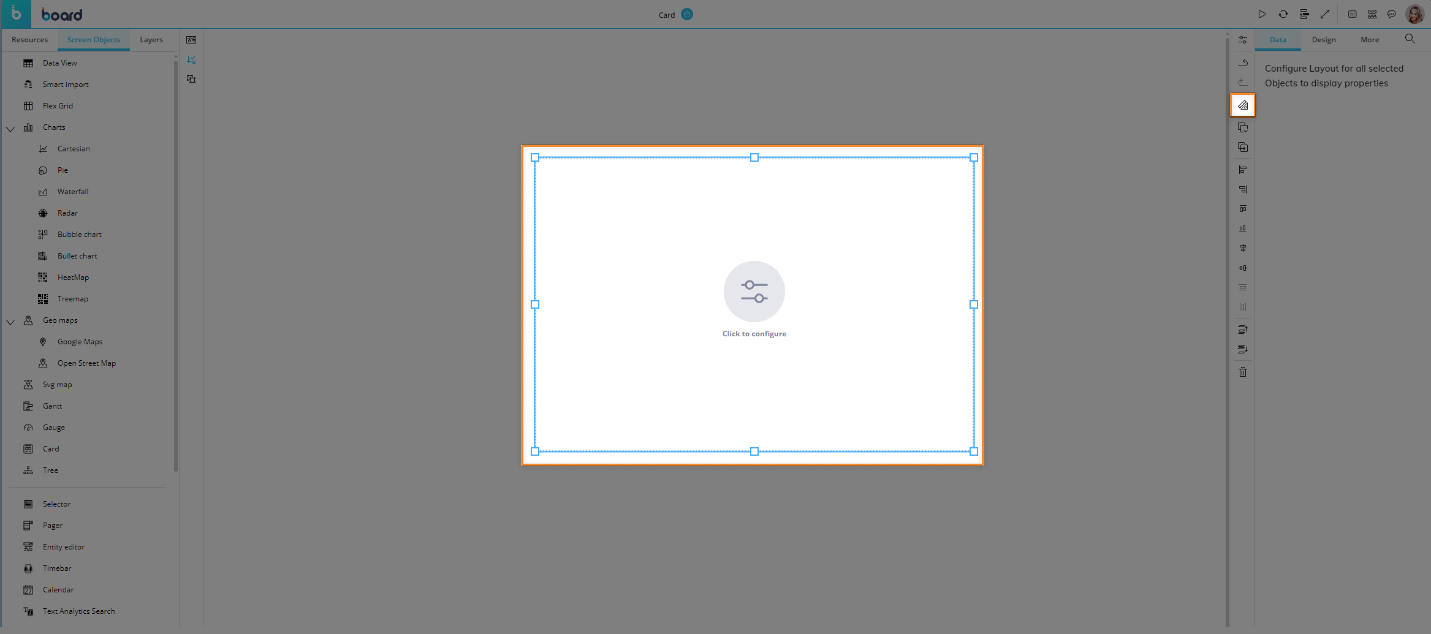
See The Layout Object, Configure a Layout, and About Data Blocks of a Layout for more details on the Layout Object.
Card Layout
The Layout editor for the Card Object is slightly different from the classic one in that it offers some Object-specific options and properties.
The main difference is that the Axes can only be dimensioned with "By Row":
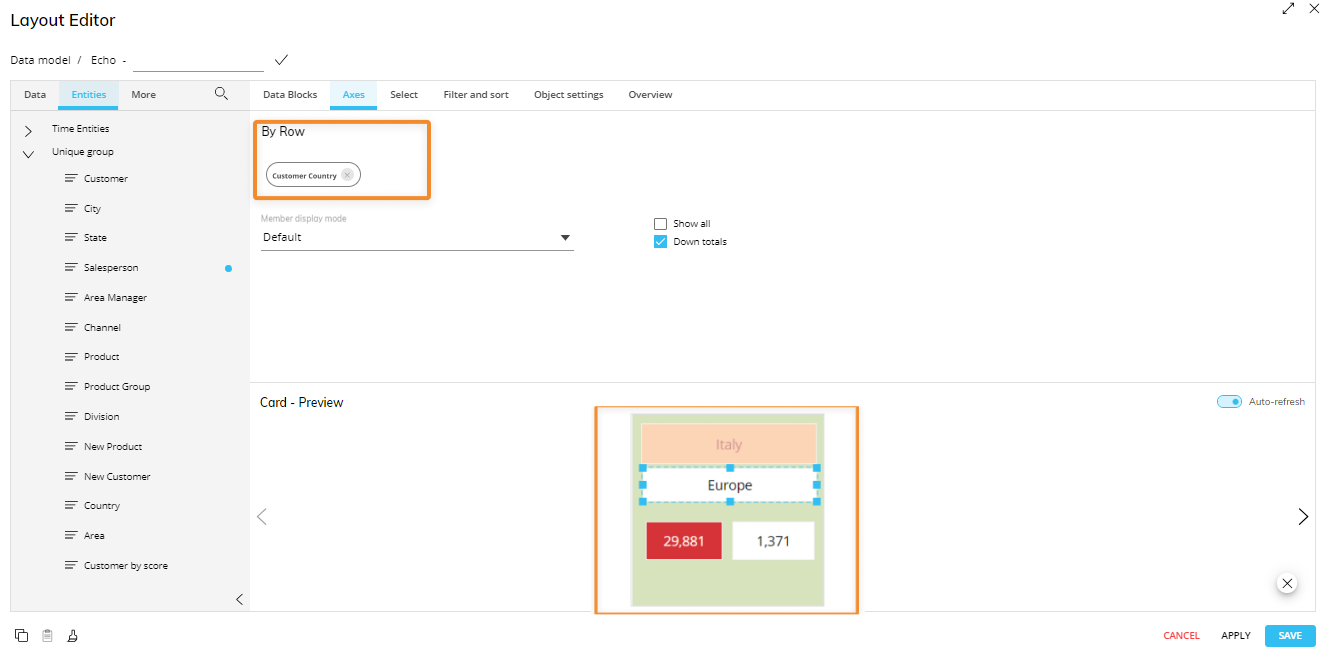
The Data area
The Data area of a Card Object Layout supports all kinds of Data Blocks (Cubes, Algorithms, Entities, etc.). All Data Blocks settings but the Detail By property are supported: for example, you can enable the Data Entry option on one Block and the Color alert option on another one.
Axes area
The Card Object supports only one Entity By Row and no Entities by Column.
Once an Entity is set By Row, the Card Object will display data from all Blocks defined in the Data area for each member of that Entity.
The "Down totals" option is available in the Axes area settings, but it's not supported by the Card Object: any changes made to it will be ignored.
The Object preview pane
Each Block set in the Data area is instantly displayed as a rectangle within a card element in the Object preview pane, as shown in the following image.
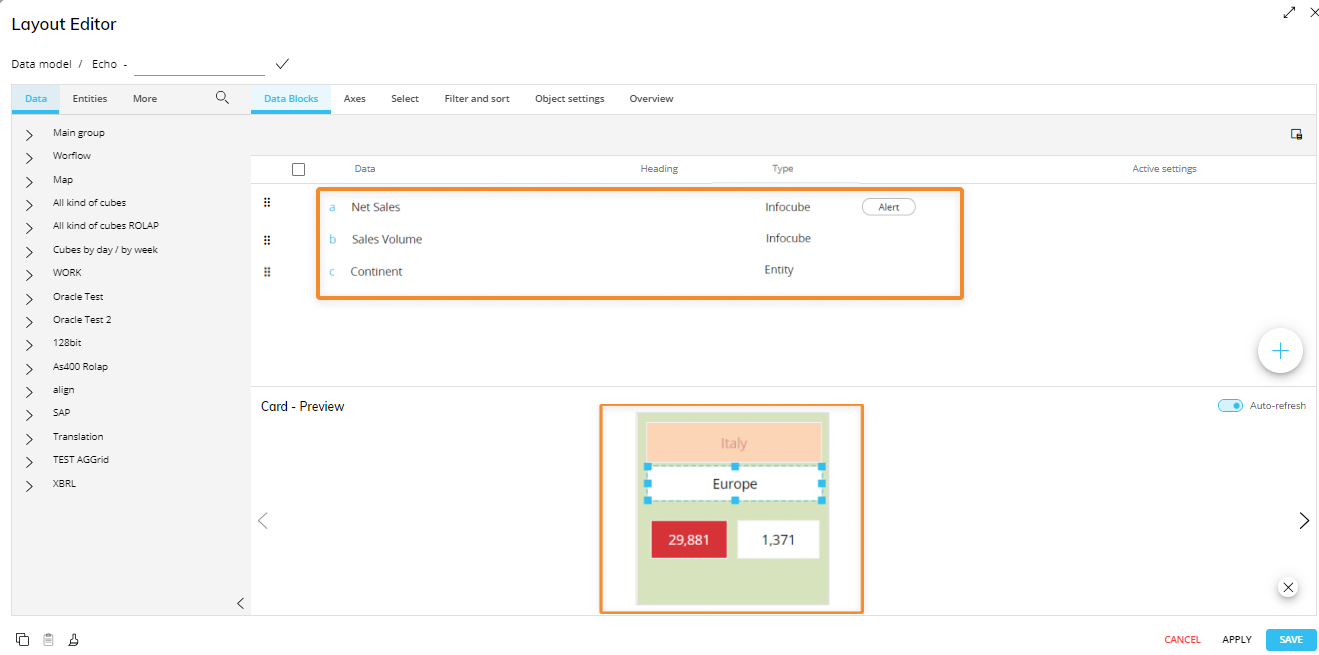
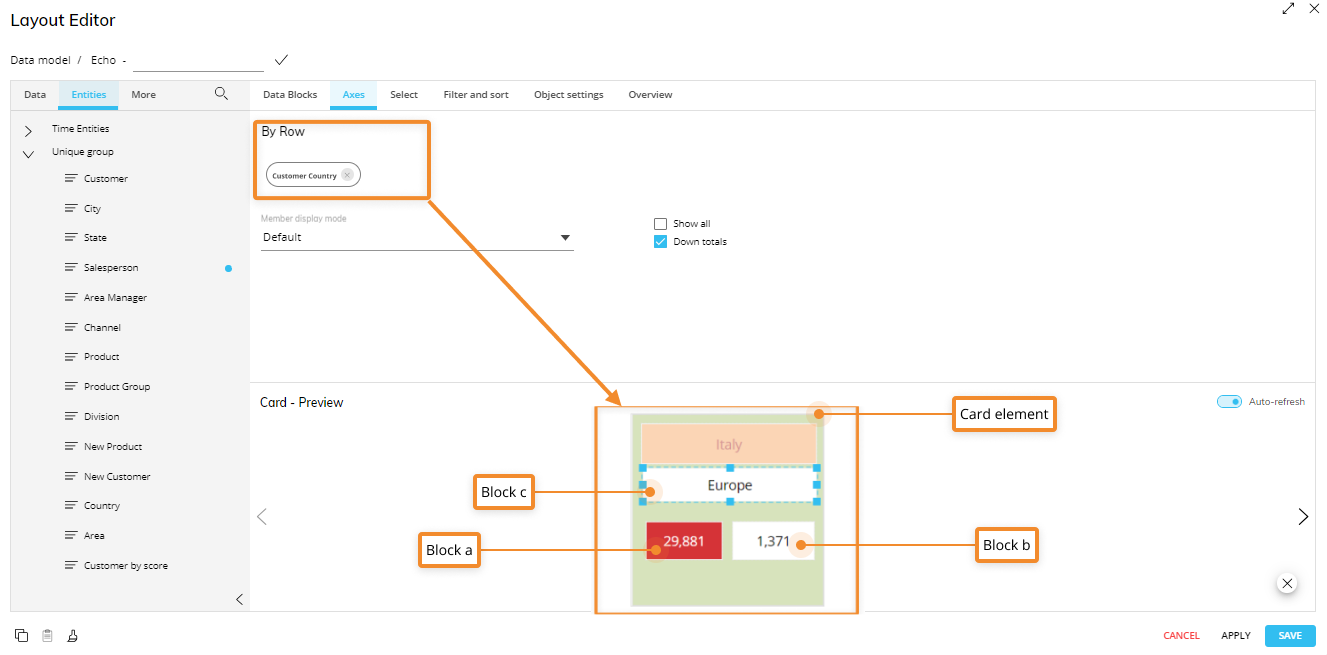
Each rectangle can be moved and/or resized inside the card element within the Preview, just like Objects on a Screen: the configured size and position of each rectangle will be replicated for each card element displayed in the Object area.
You can preview all cards that will be displayed in the Object area by clicking the previous/next arrows on the sides of the Preview pane.
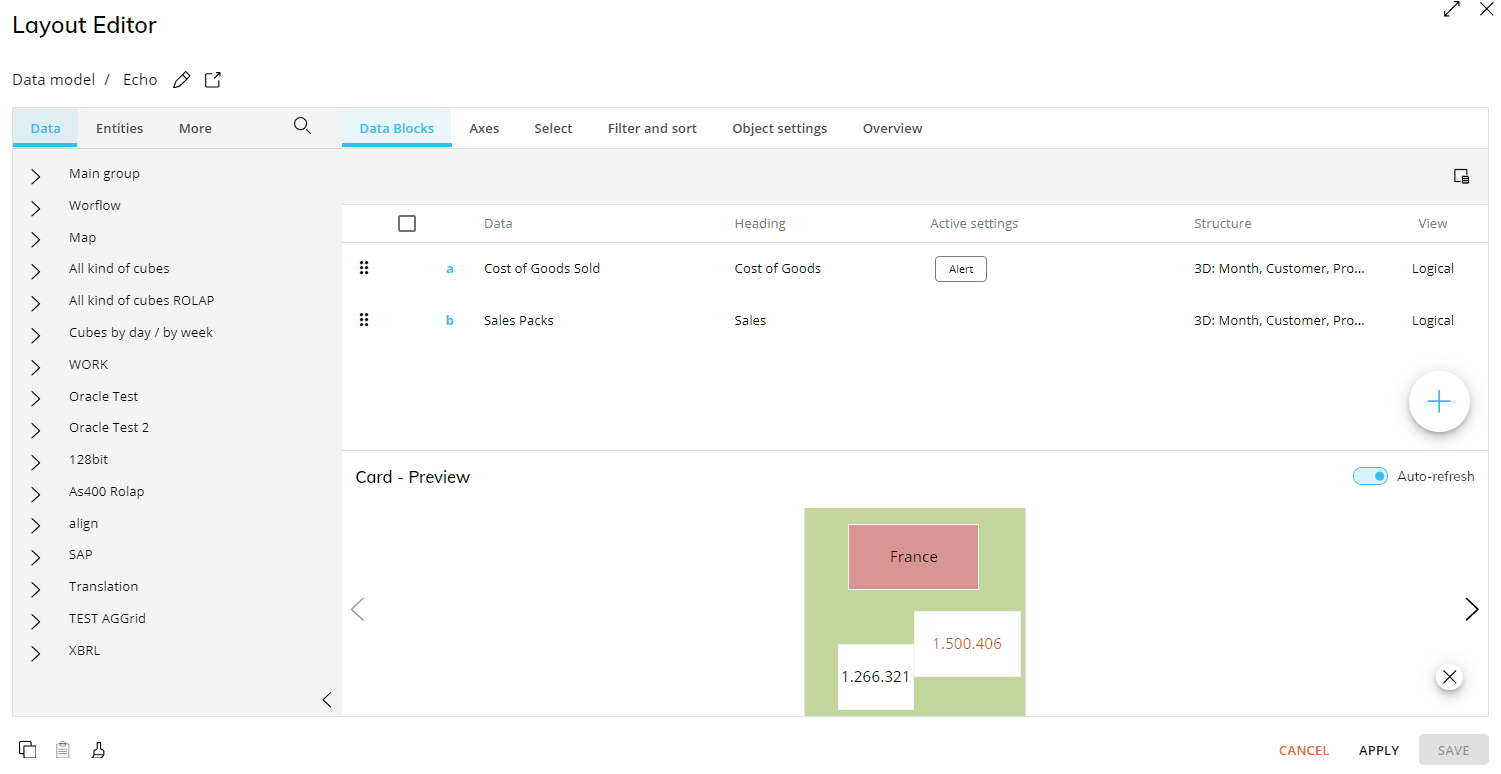
Text displayed in the Card Object wraps automatically, based on the available space on the line. If such text is only one word that doesn't fit the available space on the line, it will be truncated and an ellipsis will be displayed.
Object settings
In the Object settings of the Layout editor, the Column appearance menu allows you to configure how cells (rectangles) should look. The following options are available in the dropdown menu for each Data Block:
Button
Checkbox
Default
You can also click "CONFIGURE DRILL" to configure a Drill on one or more Data Blocks. See the several Drill-related paragraphs below for more details.
Card properties and settings
Card properties are available from the Object Properties panel on the right of the Screen editing page once the Object is selected and it's associated with a Layout.
The Card Object supports all options common to all Screen Objects except the "Disable Drill down" option.
Properties specific to the Card Object are highlighted in the following image and explained below.
The Card Object is responsive: once the Layout is configured, the Object area will display as many card elements as possible on each line.
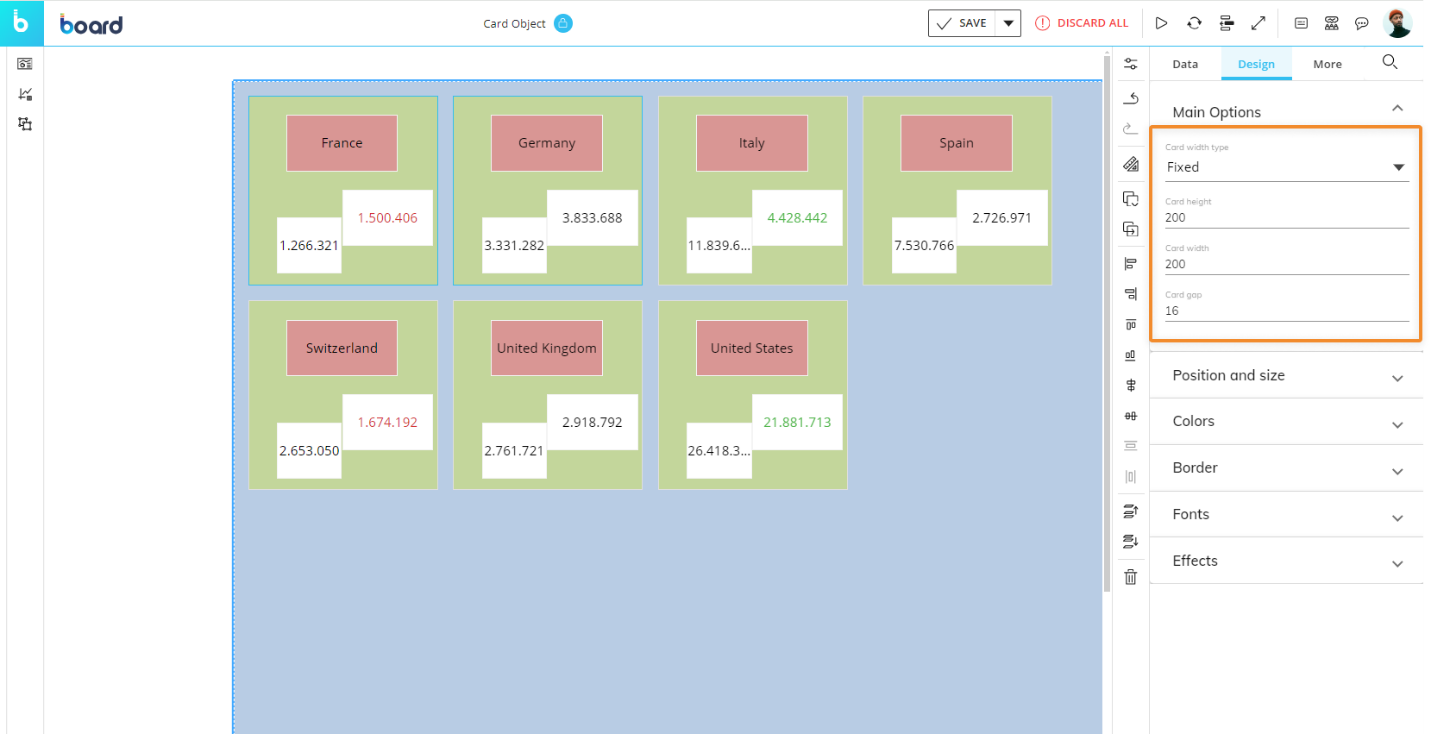
Main options of Design Object Properties
You can set a fixed or dynamic card size from the card settings panel. You can also configure a gap (space) around each card element.
Additionally, there is a dynamic option for the Card width that will automatically resize the Object within the specified maximum and a minimum width. These sizes are measured in pixels.
Under the Design tab of the Object Properties panel, the following options are available:
Card width type. Choose from Fixed or Dynamic.
Card height. When the "Fixed" or "Dynamic" card width type is selected, enter the desired card height in pixels.
Card width. When the "Fixed" card width type is selected, enter the desired card width in pixels.
Card min width/Card max width. When the "Dynamic" card width type is selected, card elements will automatically resize within these limits, depending on the user's screen size.
Card gap. Enter the desired space you want to add around each card element, in pixels. This setting is always respected, regardless of the active Card width type option.
Interacting with the Card Object in Design mode
In Design Mode, the Card Object provides the same interactive features available in Play Mode, with a few notable differences regarding the Drill functions.
You can also configure which options will be available in the Object toolbar in Play mode. To do so, double-click or Ctrl + click the Object area and click the Object toolbar icon (  ) in the top left corner, then expand it by clicking on the 3 vertical dots: the configuration panel is accessible from the cog icon in the top right corner.
) in the top left corner, then expand it by clicking on the 3 vertical dots: the configuration panel is accessible from the cog icon in the top right corner.
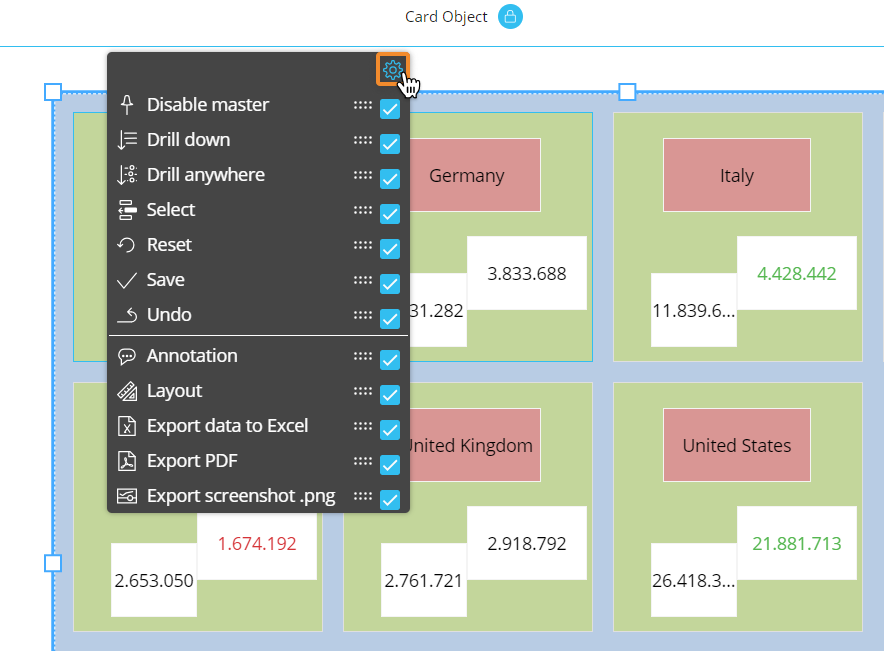
Default drill down
You can configure a drill-down path that will be saved in the Card configuration, which will be the default drill that is performed in Play Mode when Planners click on the Drill Down icon (  ) or double-click on a member of the Entity set by row displayed in the card element. You can create one default drill that drills by an Entity, Screen, Procedure, or Drill Through. Default drills for Screens, Procedures, and Drill Throughs are explained below under the respective heading.
) or double-click on a member of the Entity set by row displayed in the card element. You can create one default drill that drills by an Entity, Screen, Procedure, or Drill Through. Default drills for Screens, Procedures, and Drill Throughs are explained below under the respective heading.
To configure the default Drill Down on an Entity:
In a card element, select a member of the Entity set By row.
Click on the Drill Anywhere icon (
 ).
).From the popup window, select the Entity to drill down on and click "APPLY". The configured drill is performed and data is displayed in a Data View.
Close the drill-down window and save the Screen. The configured Drill is now the default, both in Design and Play Modes.
End users will still be able to configure other drill-down paths in Play Mode, if they're allowed to do so. See the next paragraph below for more details.
Screen selections and selections made by the user using Selector Objects (if any) also apply to data in drill-down windows.
The Drill Down configuration process can also be started by double-clicking on the item you want to associate a drill-down path with if no configuration is yet set.
Limit Drill Down Entities
You can limit drill-down paths that the Planners are enabled to configure by selecting the Entities the user can drill down on.
To do so, while in Design Mode, click on "CONFIGURE" in the top right corner of the Drill Anywhere window to enter the Drill Anywhere configuration window. From here, under the Entities tab, select/unselect the Entities you want to show/limit to the Planners. The selected Entities will be the only ones available to the Planners during the Drill Anywhere configuration in Play Mode.
You can eliminate drill downs on any Entity all together by switching the toggle for Entities to off. The end user will not be able to perform drill downs. This is enabled by default.
To configure a default drill-down path from the Layout editor:
Select the Card and open the Layout editor.
Go to Object settings.
Go to the Column appearance menu. You can also change the cell appearance by selecting one of the options listed in the dropdown menu. Click on the "CONFIGURE DRILL" button to configure a Drill on one or more Data Blocks.
Select the subpage and select the element you want to create a default drill for and click "APPLY" or double-click the element to save the default drill.
Save the Layout.
Drill-to-Screen
To allow users to drill down from a member of the Entity set By Row displayed in a card element to another Screen of the same Capsule with a selection on that same member:
In a card element, select a member of the Entity set By Row.
Click on the Drill Anywhere icon (
 ).
).From the popup window, click on the "CONFIGURE" button in the top right corner of the window to enter the "Drill Anywhere configuration" window, and click on the "Screen" subpage. Enable the toggle next to the Screen subpage title and select all the Screens that you would like to allow the end user to drill to.
These Screens will be the only ones available when conducting a Drill-to-Screen for both Design and Play Modes, however, in Design Mode, you can see any hidden Screens from the Drill Anywhere window when you enable the "Show hidden" toggle in the top right corner of the window (which also shows you the hidden drills.
Click "APPLY" to close the configuration window.
From the Drill Anywhere window, you can now further configure your Drill-to-Screen with the following options:
Select the "Same tab" checkbox to open the destination Screen in the same browser tab.
Select the "New tab" to open in a new tab.
The Drill to Screen mode, if enabled, will open the destination Screen with a selection on the row header (a member of the Entity set By Row) when the user double-clicks on it or selects it and clicks on the Drill Down icon (
 ).
).The Go to Screen mode, if enabled, will open the destination Screen when the user double-clicks on a row header (a member of the Entity set By Row) or selects it and clicks on the Drill Down icon (
 ). The destination Screen won't inherit any selection from the Data View.
). The destination Screen won't inherit any selection from the Data View.The Dynamic Screen option allow to select a Block (an Algorithm) to dynamically change the Screen navigation based on another Block values (a text cube containing Screen names).
Click "APPLY" to save the configuration.
The Drill-to-Screen configuration process can also be started by double-clicking on the item you want to associate a drill path with if no configuration is yet set.
To create a default Drill-to-Screen configuration:
In a card element, select a member or double-click on the Object and click on the Drill Anywhere icon (
 ).
).Select the Screen tab. If the "Screen" is not yet configured, enable the "Show hidden" toggle in the top right corner of the window.
If "Screen" is not yet configured as a drill option for Planners from the Drill Anywhere configuration window, you will not see a Screen tab in the Drill Anywhere window. You can make a default Drill-to-Screen without enabling Drill-to-Screens for the Planners. To do so, enable the "Show hidden" toggle in the top right corner of the window to see all the possible drills. If the drill headers are not configured for the Planners, then they have a "hidden" tag available next to their heading.
Make a Screen selection and click "APPLY" or double-click a Screen to save the Drill-to-Screen default configuration and close the window.
The Drill-to-Screen configuration process can also be started by double-clicking on the item you want to associate a drill path with if a configuration isn't already set.
To configure a Drill-to-Screen with a selection filter applied based on the selected member of the Entity set By Row from the Layout editor:
Select the Card and open the Layout editor.
Go to Object settings.
Go to the Column appearance menu. You can also change the cell appearance by selecting one of the options listed in the dropdown menu. Click on the "CONFIGURE DRILL" button to configure a Drill-to-Screen on one or more Data Blocks. Click on the "Screen" subpage.
Check the "Same tab" checkbox to open the destination Screen in the same browser tab, and "New tab" to open in a new tab.The Drill to Screen mode, if enabled, will open the destination Screen with a selection based on the on the row header (a member of the Entity set By Row) corresponding to the cell selected or double-clicked by the user in the Data View.
Screen selections and selections made by the user using Selector Objects (if any) also apply to data in the target Screen.
The Go to Screen mode, if enabled, will open the destination Screen when the user double-clicks on a cell of a configured Block or selects it and clicks on the Drill Down icon (
 ). The destination Screen won't inherit any selection from the Data View.
). The destination Screen won't inherit any selection from the Data View.The Dynamic Screen option allow to select a Block (an algorithm) to dynamically change the Screen navigation based on another Block values (a text cube containing Screen names).
Save the Layout.
The Drill action will be triggered only if the user clicks on the rectangle corresponding to the Block where the Drill-to-Screen has been configured.
This feature allows you to nest your analysis in a more powerful way than the standard Drill Down, which only changes the level of granularity of a report. In a Drill-to-Screen navigation the data represented (values, indexes) and types of objects (Charts, Dashboards, Data Views) may vary as the user drills from a top level view to another Screen at a more detailed level.
Screen selections and selections made by the user using Selector Objects (if any) also apply to data in in the target Screen.
Drill-Procedure
It is possible to trigger a Procedure from a member of the Entity set by row displayed in a card element when the user double-clicks on it. The Procedure is launched with a selection filter applied based on the member clicked in the card element.
If a Drill-Procedure containing two or more Procedures is configured, when the user double-clicks on a member of the Entity set by row displayed in a card element, a pop-up window will allow the selection of the Procedure to be performed.
To configure a Drill-Procedure on a member of the Entity set By Row displayed in a card element:
In a card element, select a member of the Entity set By Row.
Click on the Drill Anywhere icon (
 ).
).From the popup window, click on "CONFIGURE" in the top right corner of the window to open the Drill Anywhere configuration window and select the Procedures tab.
Select the Procedures for the drill configuration. Choose whether the Procedure comes from the "Capsule" or the "Data model" and then select the Procedure from the dropdown menu (as described below).
Capsule. If selected, the dropdown menu to the right allows you to choose from a list of Procedures saved at the Capsule level.
Data model. If selected, select a Data model from the dropdown menu on the right. By doing so, only Procedures belonging to the chosen Data Model will display in the dropdown menu to the right.
After you've chosen the desired Procedure, click the "ADD" button on the right. Repeat the process for each Procedure that you want to add to the drill.
Enable Procedures with the corresponding toggle by the tab header to allow end users to configure a Drill-Procedure with the Procedures that you just added.
If the Procedure toggle is left disabled, its configuration will not be available in Play Mode.
Click "APPLY" to save the Drill-Procedure configuration and return to the Drill Anywhere window.
Double-click a Procedure or select one and click "APPLY" to set a default Drill-Procedure.
The Drill-Procedure configuration process can also be started by double-clicking on the item you want to associate a drill path with if a configuration isn't already set.
To configure a Drill-Procedure with a selection filter applied based on the selected member of the Entity set by row from the Layout editor:
Select the Card Object and open the Layout editor.
Click on Object settings.
Got to the Column appearance menu. You can also change the cell appearance, by selecting one of the options listed in the dropdown menu. Click on the "CONFIGURE DRILL" button to configure a Drill Procedure on one or more Data Blocks as described in bullet point n°2 of the previous bulleted list. Click on the "Procedures" subpage.
Save the Layout.
Screen selections and selections made by the user using Selector Objects (if any) also apply to data in the triggered Procedure.
Drill Through
It is possible to execute a Drill Through from a card element, when the user double-clicks on the member of the Entity set by row displayed in it. The Drill Through is executed with a selection filter applied based on the clicked Entity member.
Drill Throughs are configured in the Drill Through section of the Data Model.
To configure a Drill Through on a member of the Entity set By Row displayed in a card element:
Select the member of the Entity set by row and click on the Drill Anywhere icon (
 ).
).From the popup window, click on the "CONFIGURE" button to open the "Drill anywhere configuration" window.
Select the "Drill Through" tab. Enable the toggle next to it and add the desired Drill Throughs you'd like to be available to the Planners below. If the toggle is not enabled, the Drill Through drill down will not be available within the Drill Anywhere window (when accessed by the Object toolbar) for Designers or Planners.
Click "APPLY" to save and return back to the Drill Anywhere window where you can now configure a default Drill Through.
Click "APPLY" to save the Drill Through configuration.
The Drill Through configuration process can also be started by double-clicking on the item you want to associate a drill path with if a configuration isn't already set.
To configure a Drill Through with a selection filter applied based on the selected member of the Entity set By Row from the Layout editor:
Select the Card Object and open the Layout editor.
Click on Object settings.
Go to the Column appearance menu. You can also change the cell appearance by selecting one of the options listed in the dropdown menu. Click on the "CONFIGURE DRILL" button to configure a Drill Through on one or more Data Blocks. Click on the "Drill through" subpage.
Select a Drill Through and press "APPLY" or double-click on a Drill Through to save and close the window.
Save the Layout.
Screen selections and selections made by the user using Selector Objects (if any) also apply to data in the Drill Through.